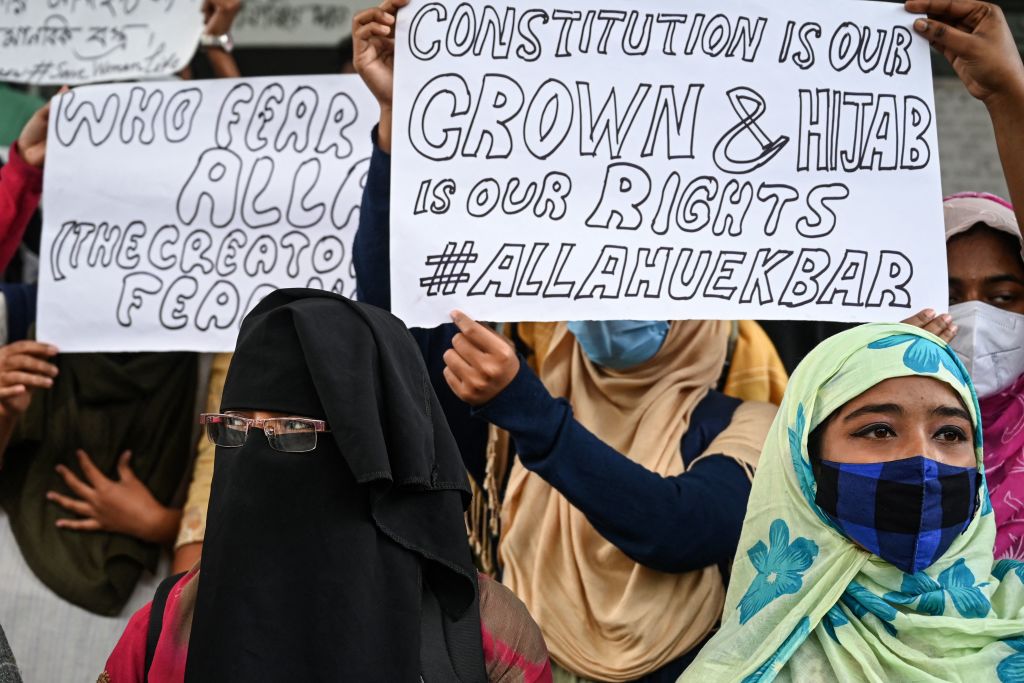- Sunday, May 05, 2024

By: Shubham Ghosh
THE high court of the southern Indian state of Karnataka on Wednesday (9) passed the decision on the current row over whether schools and colleges can ask Muslim girls not to wear hijabs (headscarves) in classrooms to a larger bench headed by its chief justice.
The court made the move a day after the face-off over the right to wear the religious headscarves forced the state’s educational institutions to shut for three days.
“These matters give rise to certain constitutional questions of seminal importance in view of certain aspects of personal law,” the judge hearing the case said, referring it to a panel of judges to be led by Ritu Raj Awasthi, the chief justice of the Karnataka High Court.
ALSO READ: Karnataka hijab row: High schools, colleges shut for three days
“In view of the enormity of questions of importance which were debated, the court is of the considered opinion that the chief justice should decide if a larger bench can be constituted in the subject matter,” Justice Krishna S Dixit said.
“The bench was also of the view that the interim prayers should also be placed before larger bench that may be constituted by Chief Justice Awasthi exercising his discretion,” he added.
A group of Muslim girls studying in government colleges in Karnataka’s Udupi district moved the court to challenge the ban imposed on wearing hijabs in classrooms.
The stand-off over wearing headscarves took a violent turn earlier this week when police officers were forced to fire tear gas to disperse a crowd at one government institution. Heavy police presence was also seen at schools in nearby towns.
Karnataka chief minister Basavaraj Bommai appealed for calm after declaring that all high schools in the state would remain closed for three days.
The controversy has snowballed over the past two months after the students at a government high school were asked not to wear hijabs. The fire soon spread to other educational institutions in the state and even in some other states.
Campuses in the state have seen escalating confrontations between Muslim students slamming the ban and their Hindu counterparts accusing them of disrupting their education.
The high court also said earlier on Tuesday that the international community is watching the hijab controversy and it is not a healthy development, the Indo-Asian News Service reported.
“For me, Constitution is Bhagvad Gita. We have to act according to the Constitution. I have come to this position after taking oath on the Constitution. The emotions on the issue should be set aside. Wearing a hijab should not become an emotional issue,” Justice Dixit said.
The bench led by him also said the government has to answer many questions on the issue.
“I am getting messages from innumerable numbers. The whole WhatsApp chat is filled with this discussion. The institutions can only work as per the constitution. The government can give orders, but people can question them,” the bench said, adding, “The government can’t come to decisions on surmises.”
“The government can’t give a ruling against the Quran. Wearing a dress of the choice is a fundamental right. Wearing a hijab is a fundamental right, however, the government can restrict fundamental rights. There is no clear order on uniforms from the government. Wearing a hijab is a matter of privacy. The government order in this regard violates the boundaries of privacy,” the bench further said.
It also asked the petitioner which page of Quran says that hijab is mandatory. The judge asked for a copy of the Quran from the court’s library. The bench asked the petitioner to read out from the holy book to understand where it has been stated so.
![]()